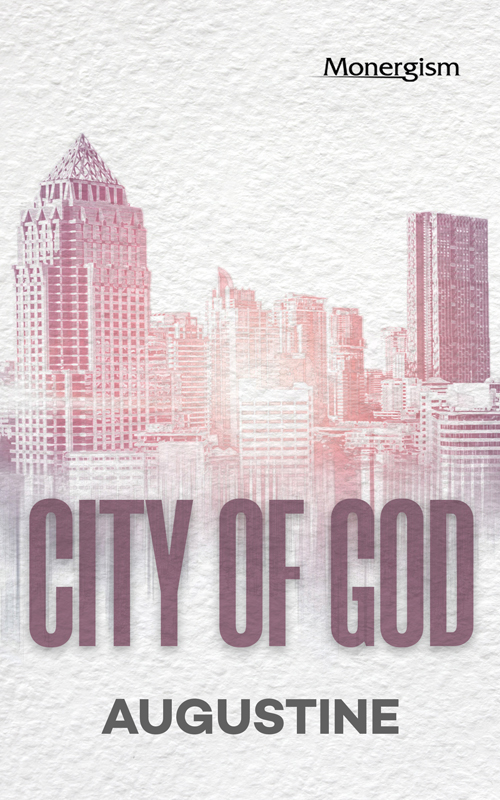 by St. Augustine
by St. Augustine
in ePub, .mobi & .pdf formats
The “City of God” is the masterpiece of the greatest genius among the Latin Fathers, and the best known and most read of his works, except the “Confessions.” It embodies the results of thirteen years of intellectual labor and study (from A.D. 413–426). It is a vindication of Christianity against the attacks of the heathen in view of the sacking of the city of Rome by the barbarians, at a time when the old Græco-Roman civilization was approaching its downfall, and a new Christian civilization was beginning to rise on its ruins. It is the first attempt at a philosophy of history, under the aspect of two rival cities or communities,—the eternal city of God and the perishing city of the world.
This was the only philosophy of history known throughout Europe during the middle ages; it was adopted and reproduced in its essential features by Bossuet, Ozanam, Frederick Schlegel, and other Catholic writers, and has recently been officially endorsed, as it were, by the scholarly Pope Leo XIII. in his encyclical letter on the Christian Constitution of States (Immortale Dei, Nov. 1, 1885); for the Pope says that Augustin in his De Civitate Dei, "set forth so clearly the efficacy of Christian wisdom and the way in which it is bound up with the well-being of States, that he seems not only to have pleaded the cause of the Christians of his own time, but to have triumphantly refuted the false charges [against Christianity] for ever."
"The City of God" is also highly appreciated by Protestant writers as Waterland, Milman, Neander, Bindemann, Pressensé, Flint (The Philosophy of History, 1874, pp. 17 sqq.), and Fairbairn, (The City of God, London, 2nd ed., 1886, pp. 348 sqq.). Even the skeptical Gibbon, who had no sympathy whatever with the religion and theology of Augustin, concedes to this work at least "the merit of a magnificent design, vigorously, and not unskillfully executed." (Decline and Fall, Ch. xxviii. note, in Harper's ed., vol. III., 271.)
-----
Table of Contents
EDITOR'S PREFACE
TRANSLATOR'S PREFACE
BOOK I: Augustin censures the pagans, who attributed the calamities of the world, and especially the sack of Rome by the Goths, to the Christian religion and its prohibition of the worship of the gods
BOOK II: A review of the calamities suffered by the Romans before the time of Christ, showing that their gods had plunged them into corruption and vice
BOOK III: The external calamities of Rome
BOOK IV: That empire was given to Rome not by the gods, but by the One True God
BOOK V: Of fate, freewill, and God's prescience, and of the source of the virtues of the ancient Romans
BOOK VI: Of Varro's threefold division of theology, and of the inability of the gods to contribute anything to the happiness of the future life
BOOK VII: Of the "select gods" of the civil theology, and that eternal life is not obtained by worshipping them
BOOK VIII: Some account of the Socratic and Platonic philosophy, and a refutation of the doctrine of Apuleius that the demons should be worshipped as mediators between gods and men
BOOK IX: Of those who allege a distinction among demons, some being good and others evil
BOOK X: Porphyry's doctrine of redemption
BOOK XI: Augustin passes to the second part of the work, in which the origin, progress, and destinies of the earthly and heavenly cities are discussed.—Speculations regarding the creation of the world
BOOK XII: Of the creation of angels and men, and of the origin of evil
BOOK XIII: That death is penal, and had its origin in Adam's sin
BOOK XIV: Of the punishment and results of man's first sin, and of the propagation of man without lust
BOOK XV: The progress of the earthly and heavenly cities traced by the sacred history
BOOK XVI: The history of the city of God from Noah to the time of the kings of Israel
BOOK XVII: The history of the city of God from the times of the prophets to Christ
BOOK XVIII: A parallel history of the earthly and heavenly cities from the time of Abraham to the end of the world
BOOK XIX: A review of the philosophical opinions regarding the Supreme Good, and a comparison of these opinions with the Christian belief regarding happiness
BOOK XX: Of the last judgment, and the declarations regarding it in the Old and New Testaments
BOOK XXI: Of the eternal punishment of the wicked in hell, and of the various objections urged against it
BOOK XXII: Of the eternal happiness of the saints, the resurrection of the body, and the miracles of the early Church:
